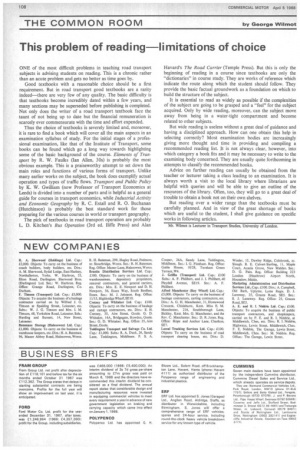This problem of reading limitations of choice
Page 110

If you've noticed an error in this article please click here to report it so we can fix it.
ONE of the most difficult problems in teaching road transport subjects is advising students on reading. This is a chronic rather than an acute problem and gets no better as time goes by.
Good textbooks with a reasonable choice should be a first requirement. But in road transport good textbooks are a rarity indeed—there are very few of any quality. The basic difficulty is that textbooks become incredibly dated within a few years, and many sections may be superseded before publishing is completed. Not only does the writer of a road transport textbook face the taunt of not being up to date but the financial remuneration is scarcely ever commensurate with the time and effort expended.
Thus the choice of textbooks is severely limited and, moreover, it is rare to find a book which will cover all the main aspects in an examination syllabus of study. For the initial stages of a professional examination, like that of the Institute of Transport, some books can be found 'which go a long way towards highlighting some of the basic background of the course. Elements of Transport by R. W. Faulks (Ian Allen, 30s) is probably the most obvious example. This is a praiseworthy attempt to set down the main roles and functions of various forms of transport. Unlike many earlier works on the subject, the book does exemplify actual operation and types of traffic flows. Transport and Public Policy by K. W. Gwilliam (now Professor of Transport Economics at Leeds) is divided into a number of parts and is helpful as a general guide for courses in transport economics, while Industrial Activity and Economic Geography by R. C. Estall and R. 0. Buchanan (Hutchinson) is probably the best standard work for those preparing for the various courses in world or transport geography.
The pick of textbooks in road transport operation are probably L. D. Kitchen's Bus Operation (3rd ed. Iliffe Press) and Alan Havard's The Road Carrier (Temple Press). But this is only the beginning of reading in a course since textbooks are only the "dictionaries" in course study. They are works of reference which indicate the route along which the student should follow. They provide the basic factual groundwork as a foundation on which to build the structure of the subject.
It is essential to read as widely as possible if the complexities of the subject are going to be grasped and a "feel" for the subject acquired. Only by wide reading, moreover, can the subject move away from being in a water-tight compartment and become related to other subjects.
But wide reading is useless without a great deal of guidance and having a disciplined approach. How can one obtain this help in selecting correctly? Most examination bodies are increasingly giving more thought and time in providing and compiling a recommended reading list. It is not always clear, however, into which category a book fits and it may be necessary to write to the examining body 'concerned. They are usually quite forthcoming in attempts to classify the recommended books.
Advice on further reading can usually be obtained from the teacher or lecturer taking a class leading to an examination. It is always worth a visit to the local library where librarians are helpful with queries and will be able to give an outline of the resources of the library. Often, too, they will go to a great deal of trouble to obtain a book not on their own shelves.
But reading over a wider range than the textbooks must be carefully planned. And in view of the great shortage of books which are useful to the student, I shall give guidance on specific works in following articles.
Mr. Wilmot is Lecturer in Transport Studies, University Of London.




























































































































































